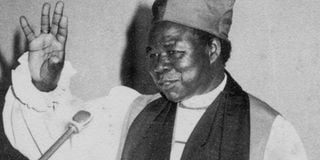Dedicate Luwum Day as national reconciliation day

Slain Archbishop Janani Luwum
What you need to know:
The issue: Luwum Day
Our view: As Ugandans, we all need to repair our broken relationships. To this end, there could be no better day than February 16, to mark Jananai Luwum Day, and celebrate it as the National Reconciliation Day for Uganda.
We should applaud the humble, but momentous gesture by the families of slain Archbishop Janani Luwum and those of Christian faithful from the birthplace of former president Idi Amin. The Kakwa, the Acholi and Langi communities and by extension the rest of Ugandans, last Saturday patched up formerly deep-seated fear, mistrust, bitterness, and even hatred created by the gruesome killing of Luwum, the late archbishop of the Church of the Province of Uganda, Rwanda, Burundi, and Boga-Zaire.
This is an unparalleled resolve, soul-searching, and great walk of faith by Christian faithful from Koboko District, who accepted to carry the burden of remorse and sought reconciliation from Christian counterparts from Mucwini in Kitgum and the country. We should equally commend the Luwum family and Christians countrywide for genuinely casting off any bitterness and embracing their brethren from Koboko District.
At a wider level, this reconciliation extends to all scarred communities in Uganda through our country’s many brutal regimes. As the Rev Can Stephen Galenga from Koboko said, both communities and the country feel the deep and sad impact of what happened during Amin’s regime and successive regimes, scarring communities and country.
In sum, we are all scarred and no one is more scarred than the other.
Although this reconciliation comes 42 years after the martyrdom of Archbishop Luwum, it is never too late for us as a country to pick up the pieces, take similar steps and make amends among ourselves. This rare and noble gesture should set the tone for breakthrough in our country’s rapprochement. This reaching out with tears of plea of forgiveness, and hugs of reconciliation and agreeing to mend broken hearts and heal to make a fresh start is momentous.
As retired Kitgum Anglican Diocese Bishop Macleord Baker Ochola said, it was a moment that could only be appropriately described as a miracle. On the day, thousands of faithful came forward to receive prayers for forgiveness, reconciliation and healing.
And for these wonders, we now propose that the Luwum Day or commemoration of the martyrdom of Janani Luwum be dedicated, promoted and celebrated as National Reconciliation Day. As Ugandans, we all need to repair our broken relationships. To this end, there could be no better day than February 16, to mark Jananai Luwum Day, and celebrate it as the National Reconciliation Day for Uganda.
And to spread this love that Koboko has birthed, the Church of the Province of Uganda should make Luwum Day celebration rotational with every annual event led by different Anglican dioceses to popularise the day, its theme and win more goodwill, buy-in and ownership from all Christians across the country.




